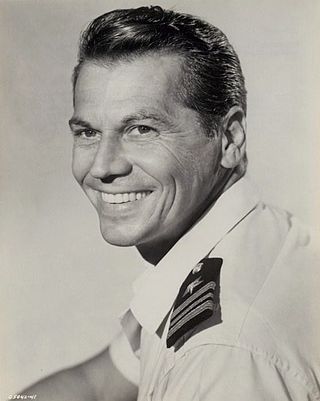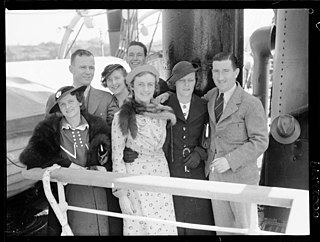Related Research Articles

Ronald Egan Randell was an Australian actor. After beginning his acting career on the stage in 1937, he played Charles Kingsford Smith in the film Smithy (1946). He also had roles in Bulldog Drummond at Bay (1947), Kiss Me Kate (1953), I Am a Camera (1955), Most Dangerous Man Alive (1961) and King of Kings (1961).
Ronald Grant Taylor was an English-Australian actor best known as the abrasive General Henderson in the Gerry Anderson science fiction series UFO and for his lead role in Forty Thousand Horsemen (1940).
Independent Theatre, formerly known as The Independent Theatre Ltd., was an Australian dramatic society founded in 1930 by Dame Doris Fitton in Sydney, Australia. It is also the name given to the building it occupied from 1939, now owned by Wenona School, in North Sydney, cited as Sydney's oldest live theatre venue.
John Forde Cazabon was an English actor and stage writer whose career began in Sydney, Australia.

Mystery Island is a 1937 Australian film shot almost entirely on location near Lord Howe Island. It is best remembered for the mysterious disappearance of two of its cast after filming completed.

Mischief in the Air is a comedy mystery play from Max Afford. The story takes place in a radio station.
The Cow Jumped Over the Moon is a 1937 Australian stage play by Sumner Locke Elliott. It was the first stage play by Elliott who was only twenty years old when it debuted.
The Little Sheep Run Fast is a 1940 Australian play by Sumner Locke Elliott. Being a drama, it was a change of pace from his first two stage plays which were both comedies.

George Leslie Clarke Rees was an Australian writer for children who was born and raised in Perth, Western Australia.

May Hollinworth was an Australian theatre producer and director, former radio actress, and founder of the Metropolitan Theatre in Sydney. The daughter of a theatrical producer, she was introduced to the theatre at a young age. She graduated with a science degree, and worked in the chemistry department of the University of Sydney, before being appointed as director of the Sydney University Dramatic Society, a post she held from 1929 until 1943
The Break is a 1962 Australian play by Philip Albright. Albright was an American writer and actor who had moved to Australia. He died in 1959 and the play debuted after his death. It was an early Australian play to depict homosexuality.
The Playwrights' Advisory Board was an Australian organisation established in 1938 to assist the cause of Australian playwriting. It was established by Leslie Rees, Rex Rienits and Doris Fitton. Its functions included negotiating productions with theatres, acting as an intermediary in the nomination and collection of royalties, advising theatres and playwrights on scripts, and holding script competitions. Members of the board included names such as Dymphna Cusack and Sumner Locke Elliott.
Red Sky at Morning is a 1935 Australian stage play by Dymphna Cusack. The play helped launch Cusack's writing career and was filmed in 1943.
Sons of the Morning is a 1945 verse drama Australian play by Catherine Duncan. It was originally written for radio.
Barbara is a 1966 Australian stage play by Mona Brand. The original production was sponsored by the Elizabethan Theatre Trust. The Sydney Morning Herald called it "divertingly unpredictable."
Pirates at the Barn is a 1948 Australian stage play for children. It made its debut in 1948 and was very popular, being performed at the Minerva Theatre in 1949. The cast for that production included Grant Taylor and John Meillion.
Early in the Morning is a 1946 Australian radio feature by Ruth Park about Abel Tasman.
The Harp in the South is a 1949 Australian stage play by Ruth Park and Leslie Rees based on the novel of the same name by Park. A number of changes were made in the adaptation, with Rees focusing on the structure and Park the dialogue.
Peter Finch is an Australian actor whose career spanned more than forty years.
My Life is My Affair is a 1946 Australian play by Oriel Gray. It won first prize in the Wagga one act play competition. The play was performed in Wagga Wagga and in Sydney.
References
- ↑ "SOMETHING PERSONAL Massacre At Midnight". The Sydney Morning Herald . No. 34, 170. New South Wales, Australia. 28 June 1947. p. 10. Retrieved 18 July 2023– via National Library of Australia.
- ↑ Rees, Leslie (1953). Towards An Australian Drama. p. 143.
- ↑ "Dickens And His Women". The Sydney Morning Herald . No. 34, 182. New South Wales, Australia. 12 July 1947. p. 10. Retrieved 18 July 2023– via National Library of Australia.
- ↑ "Vivid And Violent New Play". The Sydney Morning Herald . No. 34, 857. New South Wales, Australia. 9 September 1949. p. 5. Retrieved 18 July 2023– via National Library of Australia.
- ↑ "THEATER". Catholic Weekly . Vol. VIII, no. 394. New South Wales, Australia. 15 September 1949. p. 5 (Magazine Section). Retrieved 18 July 2023– via National Library of Australia.
- ↑ "AUSTRALIAN PLAY". The Age . No. 29, 854. Victoria, Australia. 3 January 1951. p. 4. Retrieved 18 July 2023– via National Library of Australia.
- ↑ "Australian plays at the Union Theatre". The Sydney Morning Herald. 10 January 1962. p. 6.
- ↑ "Musicals outshone the plays". The Sydney Morning Herald. 16 July 1962. p. 77.
- ↑ "Radio". The Age. 8 December 1966. p. 39.
- ↑ "Radio". The Age. 5 July 1973. p. 43.